|
After assembling around 9 a.m. Friday
and spotting our vehicles, the six of us enjoyed an easy on-trail
hike through a mostly beech-maple forest. Long stretches of
the trail were bordered by mounds of lichen. Other areas were
decorated with wintergreen and rust-colored bunchberry leaves.
In some locations, we passed delicate yellow-orange tamaracks
standing among dark green pines. We ended up stopping for
lunch at 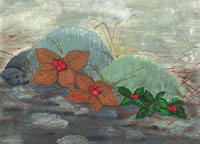 a
very scenic spot near Guard Lake. a
very scenic spot near Guard Lake.
Mounds of lichen,
bunchberry,
wintergreen,
and pine needles
covered many of the
rocks along the
North Country Trail.
(Watercolor by Mary Powell)
After lunch we opted for some exploring
and bushwhacked over a hill and into a draw that, at least
on the topo map, appeared to be an interesting spot to camp.
Not so! Swamp and more swamp. After the long bushwhack, I
noticed my socks were "fuzzy" with hitchhikers.
Thousands of seeds had attached themselves to my socks.
We switched to plan B and followed azimuths
and old two-tracks to the confluence of the Chub Creek and
a small unnamed stream. There we found an excellent bivouac
spot on an old railroad grade surrounded by the sounds of
flowing water.
While the rest of us set up camp just after
5 p.m., Michael ate his supper quickly and then ventured into
the darkness to meet two members of the group who had been
unable to come up in the morning.
About three hours later, he reappeared
with Gail and John C., their headlamps bobbing in the darkness
like so many one-eyed aliens. They were waiting for him, just
like they said they would, on a back road several miles west
of our bivouac location.
While Michael indicated that the night
navigation involved in the hookup was an interesting exercise,
he didn't plan to make a habit of picking up hikers that way
in the future.
During the still night, I took in the soothing
sounds of water trickling over a distant beaver dam and then
gurgling by me in an adjacent creek. Later, drops of water
fell softly on my tarp.
Gail later recalled that bivouacking in
the darkness turned out to be very fascinating for her. "Setting
up my tarp in the dark," she commented, and then "finding
out in the morning of the wondrous location (the spatial arrangement
seemed so different the night before)."
Saturday morning seemed a long time coming
according to John H. "The [winter] sun sets early and
rises late," he said. "Too many hours in the sack!"
After a hearty breakfast, the eight of us began the day by
bushwhacking up the east side of Maple Hill in search of a
long, 50- to 100-foot-high cliff.
Hikers find the
Dolomite cliffs
along the east side
of Maple Hill.
(Photo by Gail Staisil)
Once we located the cliff, we worked our
way along it, exploring several small caves, arches, and outcroppings
as we discovered them. With his extensive knowledge of the
local geology, John C. said, "the geology of Michigan
is like a stack of cereal bowls; depressed in the middle because
the area was once beneath a sea. Some of the layers of rock
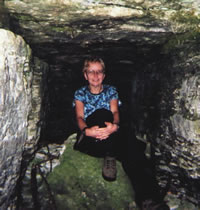 that
make the 'edges' of the 'bowls' are more resistant to erosion
than others and this cliff is one of those." that
make the 'edges' of the 'bowls' are more resistant to erosion
than others and this cliff is one of those."
Mary Powell
of Flint
explores the
Crypt cave in
the Maple Hill
Escarpment.
(Photo by Mary Powell)
He went on to say that the cliff was "composed
of dolomite which is calcium/magnesium carbonate--more durable
than 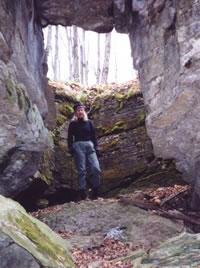 sandstone
like the cliffs at Pictured Rocks." John also noted that
this same dolomite ridge "extends west into Wisconsin
and east into New York where the Niagara River falls over
it--it's called the Niagara Escarpment." sandstone
like the cliffs at Pictured Rocks." John also noted that
this same dolomite ridge "extends west into Wisconsin
and east into New York where the Niagara River falls over
it--it's called the Niagara Escarpment."
Gail Staisil
of Midland
explores the
Chimney cave in
the Maple Hill
Escarpment.
(Photo by Gail Staisil)
Not far from the cliff, we got back on
the NCT and continued hiking northward, along Little Bear
Creek. Eventually, we stopped for a relaxing lunch at an old
beaver dam. It turned out to be a very scenic spot. As the
afternoon progressed, we found ourselves hiking through several
red pine plantations, each carpeted 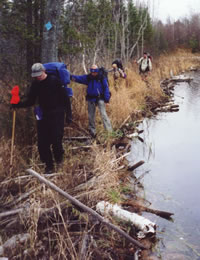 with
a soft layer of needles. In other areas along the trail, crystal
clear puddles were lined with a collage of different colored
leaves: yellow near the birches, red or gold under the maples,
and brown around the oaks. with
a soft layer of needles. In other areas along the trail, crystal
clear puddles were lined with a collage of different colored
leaves: yellow near the birches, red or gold under the maples,
and brown around the oaks.
Hikers negotiate
a long beaver
dam across the
Little Bear Creek.
(Photo by Gail Staisil)
As nightfall approached, we each selected
a spot to bed down for the night in a pine plantation along
Biscuit Creek. The man-made furrows in the ground cradled
our tired bodies. With their thick layer of pine needles,
these spots were as soft as any mattress. What a comfortable
place to camp!
During the night, I awoke to a woods silvery
with moonlight. Unfortunately, I also awoke to what seemed
to be a pack of dogs howling in the distance. They must have
become separated from their handler and abandoned for the
night, possibly with an animal treed.
As the sun rose early Sunday morning, all
that remained of the trip was a few hours of pleasant hiking
through more pine plantations. We ate lunch at one several
picturesque creeks that we crossed along the way.
When we reached the vehicles, everyone
seemed to experience the same feeling. "Is it over already?"
we wondered. "Where did the weekend go?"
_____________________
"The dolomite rock formations, the
beautiful green patterns in the lake where we met the hunters
[Trout Lake Pond] and the beaver dam lunch where I finally
mastered the bowline with the patience of Michael."
-- Gail Staisil, Midland, an experienced long-distance
solo backpacker, on what she remembered most about the trip.
"I thought the trip was just outstanding!
It was my first backpack on the NCT and I truly enjoyed
the landscape: Pine Creek, Biscuit Creek, the white cedar
swamps and the incredibly nice weather. Mike is a great
leader and prepares participants well with ample information
beforehand. His off trail, cross country, using map and
compass experiences were fun and educational--a nice diversion
from simple trail hiking."
-- Jeff Knoop, Marquette, a national trip leader with
the Sierra Club, on his impressions of his first wilderness
trip with the Central Upper Peninsula Group.
"What I like about
our trips is the element of surprise and adventure. We have
a start point and an end point, but what can happen in between
really 'makes' the trip. A section cut through the bush,
a long ago abandoned railroad, historical artifacts discovered,
escarpments and caves, clear streams and varied bivouacs
at night. . . . I would be remiss if I didn't mention my
fellow travelers. It is a pleasure to be in the company
of such enthusiastic explorers and hikers. Every trip we
take I make new friends, acquire new knowledge and learn
more bush skills. I especially enjoy sitting together over
our meals."
-- John Herrgott, Linden, an accomplished astronomer
and SEMG trip leader, on why he ventures off the trail with
the CUP group.
"Just sitting and fishing in some
of those streams would be enjoyable--shallow swiftly moving
currents, water cold enough to numb your toes, even tinted
with tannin, clear enough to see the gravel on the bottom.
Water was meant to be followed, not just crossed over and
forgotten. . . .rivers are full of possibilities. It's always
about possibilities. That is what a highlight of any trip
should be."
-- David Wiltse, Royal Oak, our resident scatologist
and avid orienteerer, on the joys of moving water: rivers,
streams, and creeks.
"I was pleasantly surprised by how
much I liked the NCT. For a weekend trip I could not ask
for much more than an extensive dolomite rock outcrop that
formed a cliff face, walking a day straight through pine
forests, and being visited by a sandhill crane perching
atop a pine tree while I was setting my bear hang."
-- John Calandra, Clarkston, a national trip leader with
the Sierra Club and professional geologist, on the North
Country Trail as a weekend destination.
Read
another journal...
|


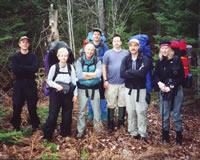
 a
very scenic spot near Guard Lake.
a
very scenic spot near Guard Lake. 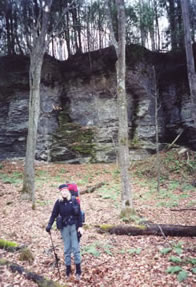
 that
make the 'edges' of the 'bowls' are more resistant to erosion
than others and this cliff is one of those."
that
make the 'edges' of the 'bowls' are more resistant to erosion
than others and this cliff is one of those."  sandstone
like the cliffs at Pictured Rocks." John also noted that
this same dolomite ridge "extends west into Wisconsin
and east into New York where the Niagara River falls over
it--it's called the Niagara Escarpment."
sandstone
like the cliffs at Pictured Rocks." John also noted that
this same dolomite ridge "extends west into Wisconsin
and east into New York where the Niagara River falls over
it--it's called the Niagara Escarpment." with
a soft layer of needles. In other areas along the trail, crystal
clear puddles were lined with a collage of different colored
leaves: yellow near the birches, red or gold under the maples,
and brown around the oaks.
with
a soft layer of needles. In other areas along the trail, crystal
clear puddles were lined with a collage of different colored
leaves: yellow near the birches, red or gold under the maples,
and brown around the oaks.